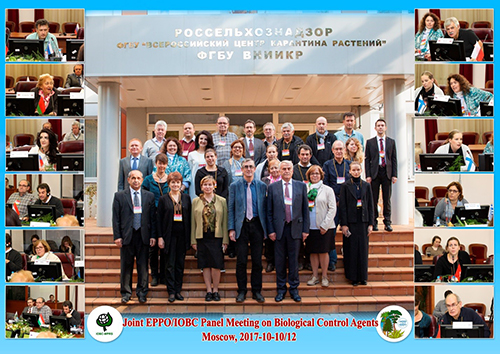
10th Joint EPPO/IOBC Panel Meeting on Biological Control Agents
Moscow, 2017-10-10/12
The Panel was held in the Russian National Plant Quarantine Centre with the participation of Russian NPPO (Rosselkhoznadzor). Host experts provided information to Panel members on the history of the use of biological control agents in the Soviet Union and the Russian Federation. They informed the Panel that the development of biological plant protection has significantly decreased in comparison with Soviet times, with 90% of BCA products now imported to the Russian Federation. The import of BCAs is not regulated but regulation is likely to be developed at the level of EurAsian Economic Union. Assessment of BCAs before release is not carried out. The main difficulties are the lack of reliable information, the lack of harmonized terminology and the focus of the plant protection industry on single-use BCAs (and other related products). The last factor is the main obstacle for the development of classical biological control.

The Panel considered the draft document on the information requirements to support the decision on additions to the EPPO list of widely used BCAs (first two tables of the EPPO Standard PM 6/3). The drafts concerning the augmentatively used BCAs and classical BCAs prepared by small groups of Panel experts were further revised by the Panel. They will be added as annex to the new ‘Procedure for addition of BCAs to the EPPO Lists’. The draft of this procedure prepared by the EPPO Secretariat was discussed and amended by the Panel and will be published on the EPPO website (after its adoption by the EPPO Working Party on Phytosanitary Regulations) for experts who wish to propose additions of BCAs to the EPPO lists.
The draft EPPO Decision-support scheme (DSS) for import and release of BCAs of plant pests was approved by the EPPO Working Party on Phytosanitary Regulations in 2017 to be sent for country consultation after testing by the Panel. The Panel confirmed that the DSS should consist of two parts. The first part should be the ‘Express assessment’ with three possible conclusions on the assessed BCA: (1) ‘allowed for release’, (2) ‘prohibited to release’ and (3) ‘full assessment is needed’. This part of the DSS was revised and agreed by the Panel. The second part of the DSS should be the very detailed ‘Full assessment’ also with three possible conclusions on the assessed BCA: (1) ‘allowed for release’, (2) ‘prohibited to release’ and (3) ‘information is inadequate to make a decision’. In the last case, the DSS allows the gaps in information and the needs of additional research to be identified. This part of the DSS was revised by the Panel. Nevertheless, several Panel members believed that even after three years of simplifications this part of the scheme was still too complicated for practical use. It was decided that those Panel members should propose additional simplifications after the meeting and then the DSS should be sent for country consultation.
The Panel considered the answers of EPPO countries to the questionnaire adopted by the EPPO Council on regulation of BCA import and releases. The Panel welcomed the decision of EPPO Council to encourage the 30 EPPO countries that did not send answers to do so.
The EPPO Work Programme concerning the use of BCAs was also discussed at the meeting as well as possible biocontrol issues in the framework of the Euphresco network and needs identified by the new EU Minor Uses Co-ordination Facility.
